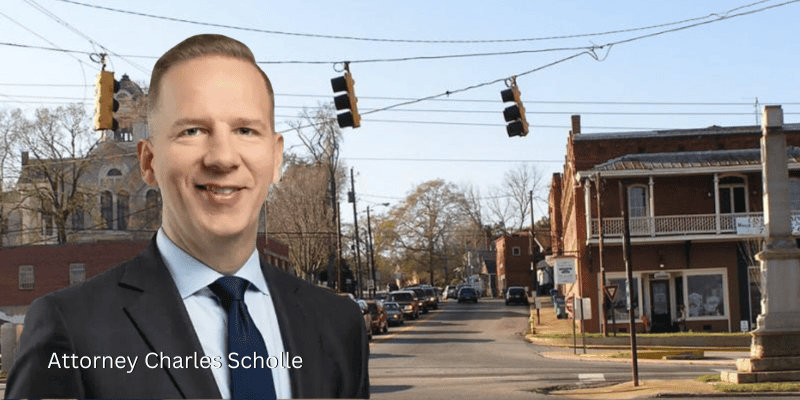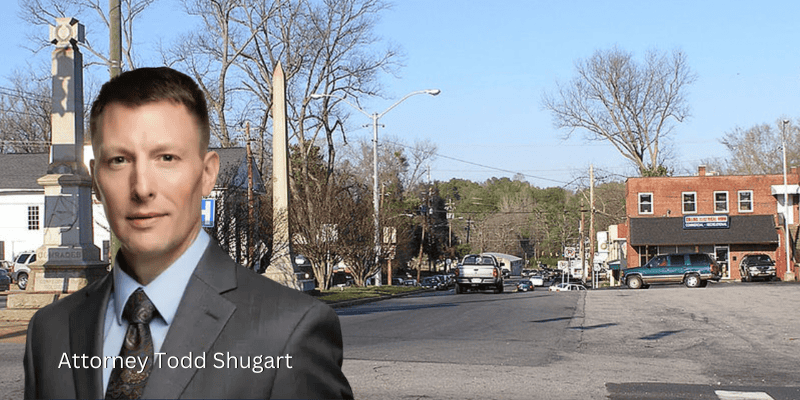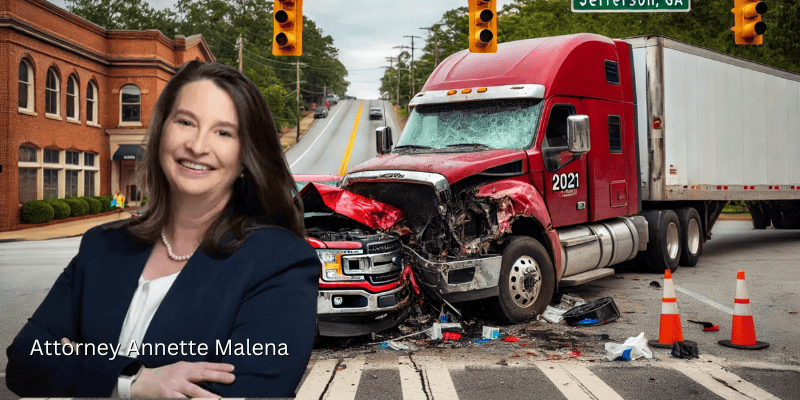4.9 Rating
Google REVIEWS
Leaders in Georgia Personal Injury Law Since 1995
Jefferson Personal Injury Lawyer

Your Local Advocate for Justice
Jefferson, Georgia, is a peaceful, historic town known for its small-town charm and proximity to larger cities like Athens and Gainesville. However, accidents happen even in the quietest of places, and when they do, they can have devastating effects on victims and their families. Injuries caused by someone else’s negligence or reckless behavior can lead to mounting medical bills, lost wages, and emotional trauma. Fortunately, Jefferson residents have access to skilled legal representation when the unthinkable happens.
At Scholle Law, we have been representing injury victims in Jackson County for over 25 years, helping them navigate the complexities of personal injury law. We have successfully recovered millions of dollars for our clients, securing the compensation they need to move forward with their lives. If you or a loved one has been injured in an accident in Jefferson, contact us today for a free consultation. Let our experienced legal team help you get the justice you deserve.

Jefferson Car Accident Lawyer
Car accidents are a common occurrence on Georgia’s roads, and Jefferson is no exception. Whether it’s a rear-end collision on a quiet street or a high-speed crash on Interstate 85, the consequences of a car accident can be severe. Victims often suffer injuries that range from whiplash and broken bones to traumatic brain injuries and spinal cord damage. Even minor accidents can lead to long-term health issues and financial difficulties.
If you’ve been injured in a car accident in Jefferson, it’s essential to have an experienced attorney by your side. At Scholle Law, our car accident lawyers understand the complexities of Georgia’s traffic laws and insurance regulations. We will thoroughly investigate your case, gather evidence, and build a strong claim to ensure you receive the compensation you deserve. Our goal is to alleviate the financial burden caused by medical bills, lost wages, and other expenses so you can focus on your recovery.
Insurance companies often try to minimize payouts by offering quick settlements that don’t cover the full extent of your damages. Don’t settle for less than you deserve. Our Jefferson car accident lawyers will negotiate on your behalf and, if necessary, take your case to trial to fight for maximum compensation. Contact us today to learn how we can help you get back on your feet after a car accident.

Jefferson Truck Accident Lawyer
Truck accidents are among the most dangerous and devastating types of collisions on the road. Due to the massive size and weight of commercial trucks, these accidents often result in catastrophic injuries or even fatalities. Victims may suffer from severe injuries such as traumatic brain injuries, spinal cord damage, internal organ damage, and permanent disfigurement. The financial toll of medical bills, rehabilitation, and lost wages can be overwhelming, not to mention the emotional trauma of dealing with such a life-altering event.
In truck accident cases, determining liability can be complicated, as multiple parties may be at fault, including the truck driver, the trucking company, and even the vehicle manufacturer. At Scholle Law, our Jefferson truck accident lawyers have extensive experience handling these complex cases. We will investigate the accident thoroughly, gathering evidence such as driver logs, maintenance records, and expert testimony to build a strong case for you. We know how to deal with trucking companies and their insurance providers, who often try to avoid paying fair compensation.
Trucking companies and their insurers will do everything they can to minimize or deny liability. That’s why it’s crucial to have an experienced truck accident lawyer fighting for your rights. At Scholle Law, we are committed to holding negligent parties accountable and securing the compensation you need to cover medical expenses, lost wages, and pain and suffering. If you or a loved one has been involved in a truck accident in Jefferson, contact us today for a free consultation.

Jefferson Motorcycle Accident Lawyer
Motorcyclists are some of the most vulnerable individuals on the road, and when accidents happen, the injuries are often catastrophic. Despite accounting for a small percentage of vehicles on the road, motorcyclists are disproportionately represented in serious accidents and fatalities. In Georgia, thousands of motorcyclists are involved in crashes every year, many of which result in severe injuries such as broken bones, road rash, spinal cord injuries, and traumatic brain injuries.
The aftermath of a motorcycle accident can be physically, emotionally, and financially devastating. Victims often face long recovery periods, expensive medical treatments, and the inability to work. At Scholle Law, our Jefferson motorcycle accident lawyers are dedicated to helping injured motorcyclists seek the compensation they need to cover medical bills, rehabilitation costs, lost wages, and pain and suffering. We understand the unique challenges that motorcyclists face on the road, including biased perceptions from insurance companies that often attempt to blame bikers for their injuries.
Our team will investigate every aspect of your accident to determine liability and build a strong case. Whether the accident was caused by a distracted driver, poor road conditions, or defective motorcycle parts, we will fight to ensure that you receive the compensation you deserve. If you’ve been injured in a motorcycle accident in Jefferson, contact Scholle Law today for a free consultation.

Jefferson Wrongful Death Lawyer
Losing a loved one in an accident caused by someone else’s negligence is a devastating experience. Families are left not only with the emotional pain of their loss but also with significant financial burdens such as medical bills, funeral costs, and the loss of future income. In Georgia, families who have lost a loved one due to negligence have the right to file a wrongful death lawsuit to seek compensation and hold the responsible party accountable.
At Scholle Law, we understand that no amount of money can replace the loss of a loved one, but a wrongful death lawsuit can help ease the financial burden and provide a sense of justice. Our Jefferson wrongful death lawyers are compassionate advocates for families who have suffered this unimaginable loss. We will guide you through the legal process, handle all aspects of your case, and fight tirelessly to secure the compensation you deserve.
Wrongful death claims can be complex, involving multiple parties and significant legal challenges. Our experienced attorneys will work closely with you to gather evidence, negotiate with insurance companies, and, if necessary, take your case to court to achieve the best possible outcome. If you have lost a loved one due to negligence in Jefferson, contact us today for a free consultation to discuss your legal options.
Frequently Asked Questions
What should I do immediately after a car accident in Jefferson?
After a car accident, your health and safety should be your top priority. Seek medical attention right away, even if you feel fine. Document the scene of the accident by taking photos and collecting contact information from witnesses. It’s also essential to avoid making any statements to the other driver’s insurance company until you’ve spoken with a lawyer.
How long do I have to file a personal injury lawsuit in Georgia?
In Georgia, the statute of limitations for filing a personal injury lawsuit is typically two years from the date of the accident. However, there are exceptions to this rule, and it’s important to consult with an attorney as soon as possible to ensure your case is filed within the required timeframe.
How much compensation can I expect from a personal injury claim?
The amount of compensation you can receive depends on the severity of your injuries and the circumstances of your case. Common forms of compensation include medical expenses, lost wages, pain and suffering, and property damage. An experienced personal injury lawyer can help you assess the value of your case.
Do I need a lawyer to file a personal injury claim?
While it’s possible to file a personal injury claim without a lawyer, having legal representation significantly increases your chances of receiving fair compensation. Insurance companies often try to minimize payouts, and an experienced attorney can negotiate on your behalf and, if necessary, take your case to court.
What if I’m partly at fault for the accident?
Georgia follows a modified comparative negligence rule, meaning that you can still recover damages if you are partly at fault, as long as your percentage of fault is less than 50%. However, your compensation will be reduced by your percentage of fault.
If you or a loved one has been injured in an accident in Jefferson, Georgia, Scholle Law is here to help. With over 25 years of experience and a track record of success, we will fight to ensure
